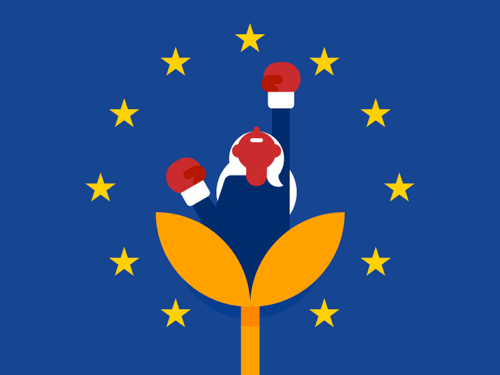The one-person entreprise: supporting freelancers in Europe
Jun 17, 2019
5 mins

What does it mean to be a freelancer today? Often operating as small business owners and working with little to no protection, freelancers lack a clear understanding of the legal and administrative policies of the country they work in, and what distinguishes them from the traditional labor market. Working in a “grey area” between full time employees and entrepreneurs, freelancers benefit from flexibility in terms of office hours and locations. But this work arrangement doesn’t always live up to the hype.
The effort required to maintain and run a business while achieving a well-balanced life is a common challenge among all freelancers. The Harvard Business Review surveyed around 400 freelancers in Europe and North America. One individual described the constant amount of outreach efforts necessary to stay in business. Along with constantly selling one’s services, loneliness and promoting a brand identity and reputation were cited as other issues freelancers face.
Besides running a company—which includes choosing the appropriate business model, managing accounts, sales, and other day to day activities—freelancers are often expected to complete projects as if they’re employees. But, unlike full time employees, they don’t receive the same benefits (such as vacation time) or job security, which ultimately benefits clients who can save on labor costs, since benefits don’t have to be paid and freelancers can bewritten offas a business expense.
To help tackle the challenges and pressures associated with the high-risk, low protection freelance life, HR departments need to implement tools and resources which enable individuals to focus more on their work. Partnering with organizations aimed at handling the administrative work for freelancers is one way to ensure increased productivity and balance.
Breaking geographical limitations
According to European Freelancers Week, there are roughly 11,000,000 freelancers in Europe alone. Although this accounts for less than 12% of the labor market, that’s a significant number of individuals across the continent—and a growing one. In thinking of this demographic as location agnostic, it’s clear how the digitization of freelance labor creates new challenges—especially for those located in expensive cities like Paris, London, and Amsterdam. Companies and agencies in these major cities can work with talent well beyond traditional geographic limitations.
In his book, The Precariat, Guy Standing, a professor of Development Studies at SOAS London, describes the pressure freelancers feel as a result of immense competition. He explains how the freelance labor market, fueled by digitization and globalization, is a seemingly open global marketplace where every individual has to outbid each other for work. In practice, this environment means freelancers often have to lower their wages to remain attractive to clients.
Every freelancer I spoke to said they had an accountant but wouldn’t recommend them, so it took two months to find one.
Tom Bourlet, a freelancer, in Brighton UK, says he is able to outbid agencies by charging less and delivering more. He also cites small businesses as being his target market for finding work. But the biggest challenge Tom faces is setting up initial meetings for new projects. He also says it was difficult to find a trustworthy accountant at a decent price.
“Every freelancer I spoke to said they had an accountant but wouldn’t recommend them, so it took two months to find one,” he says.
Traditionally, to match living expenses, wages skew higher in urban centers than the suburbs and rural areas. However, such factors make no difference to clients who hire freelancers from all corners of the world. In the case of Bourlet, he works from Brighton, and can easily compete with freelancers and agencies in London. All that matters to the client is how much they’re able to save.
Collective representation for freelancers in Europe
A 2019 study on Freelancing in France conducted by online platform Maltrevealed that, although 60% of French freelancers take at least four weeks of vacation each year, they continue to respond to client requests during their time off. They also tend to work more during the weekends than full time employees. Judging by their (lack of) work-life balance, it’s clear that freelancers need more support.
Malt’s community was created by freelancers who wanted to break the lack of transparency of some intermediaries and avoid the race to the bottom pricing, as found on some freelancing platforms.
Working with around 70,000 registered companies and 100,000 freelancers, Malt helps with administration, accounting, provides liability insurance and secured payment processing. Additionally, Malt only works with local talent and companies, meaning no labor offshoring. Camille Léage, head of community, speaks about the importance of combating service devaluation.
“Malt’s community was created by freelancers who wanted to break the lack of transparency of some intermediaries and avoid the race to the bottom pricing, as found on some freelancing platforms.”
Similarly, Smart, an organization aimed at enabling freelancers to do their jobs more effectively, operates in nine countries throughout Europe (Belgium, Germany, France, Spain, Italy, Netherlands, and Austria) and offers its members collective benefits and services such as legal, financial, administrative, and economic support, including invoice processing. In providing these resources, Smart enables freelancers to work without having to deal with the administrative hassle of setting up and running a company.
Enabling freelancers in a corporate environment
Despite a few organizations working to empower the freelancing environment in Europe, the status of freelancers in the corporate environment is still vague and undefined. Sarah De Heusch, a project officer at Smart, explains the identity crisis that freelancers experience in an article for European Freelancers week. Given the broad level of interpretation for what defines a freelancer in the realm of public policy and government regulation, there’s minimal protections offered to these individuals.
“Often there may be confusion between freelancing and self-employment. Strictly speaking, self-employment is a legal status while freelancing is not necessarily. The later refers rather broadly to a way of working and living, and covers situations that go beyond self-employment, such as people who are directly employed in a company for short assignments, those who regularly move from a company to another, to autonomous workers who chose to work under a salaried status in cooperatives or umbrella companies…”
The underlying problem remains that freelancing is still the exception, and not the rule. With a large number of freelancers worldwide working under flexible, zero-hour contracts, and the overall Uberization of the labor market, a wide-ranging social safety net for freelancers needs to be developed if we want to avoid a new underclass. Such protections cannot come solely from organizations like Malt and Smart.
Often there may be confusion between freelancing and self-employment. Strictly speaking, self-employment is a legal status while freelancing is not necessarily.
One way for freelancers to receive increased support is for more inclusion in public policy discussions and text. Projects like i-Wire geared towards mapping out “independent workers” are a good start, and so is the increased support from the European Parliament, like its 16 April 2019 push to create “minimum rights” for on-demand workers. But the question remains to what extent these legislative efforts are up to the task of providing the necessary safety net in a world of digital disruption and uncertainty.
For companies, the solutions are more immediate. As an HR professional, it’s important to show freelancers that their perspectives are valued, both in the language and tools used in the recruitment process, as well as by integrating them into the company culture once they’ve been hired. Moreover, HR professionals can help freelancers partner with platforms like Smart or Malt to alleviate administrative work.
The path to total protection for freelancers remains to be paved. By laying the groundwork for support, HR departments can make their life significantly easier. Ultimately, the most talented freelancers will gravitate to those organizations where they feel most valued.
In collaboration with Are We Europe.
Illustration: Eddie Stok

More inspiration: Employer branding

How to make your Glassdoor page an asset
50 million unique visitors flock to the Glassdoor social platform, making it the second most popular job site in the United States.
Feb 23, 2021

Recruitment marketing: the future of talent acquisition?
Recruitment marketing is the combination of digital technology and recruitment techniques to acquire high-quality talent.
Sep 16, 2019

How blockchain could transform the core of HR
Accelerate fundamental HR processes, secure payroll, verify candidate's informations ... what blockchain brings to HR.
Aug 12, 2019

The American Dream in Europe?
This study highlights a global reflection on the new challenges of the entrepreneurial culture in France and the ecosystem that accompanies it.
Aug 09, 2019

Do Androids dream of stealing our jobs?
47% of current US occupations are at high risk of being replaced by machines. This revives a timeless debate that has pervaded recent history.
Jul 22, 2019
Inside the jungle: The HR newsletter
Studies, events, expert analysis, and solutions—every two weeks in your inbox

